Top Rankings
Warrensville Heights City School District ranks among the top 20% of public school district in Ohio for:
Category
Attribute
Graduation Rate
Highest graduation rate (Top 10%)
Student Attention
Lowest student:teacher ratio (Top 1%)
For the 2025 school year, there is 1 public preschool serving 185 students in Warrensville Heights City School District.
Public Preschools in Warrensville Heights City School District have a diversity score of 0.11, which is less than the Ohio public preschool average of 0.58.
Minority enrollment is 100% of the student body (majority Black), which is more than the Ohio public preschool average of 39% (majority Black).
Overview
This School District
This State (OH)
# Schools
4 Schools
839 Schools
# Students
1,917 Students
334,112 Students
# Teachers
138 Teachers
18,897 Teachers
Student : Teacher Ratio
14:1
14:1
District Rank
Warrensville Heights City School District, which is ranked within the bottom 50% of all 918 school districts in Ohio (based off of combined math and reading proficiency testing data) for the 2021-2022 school year.
The school district's graduation rate of 95% has increased from 80-84% over five school years.
Overall District Rank
#684 out of 929 school districts
(Bottom 50%)
(Bottom 50%)
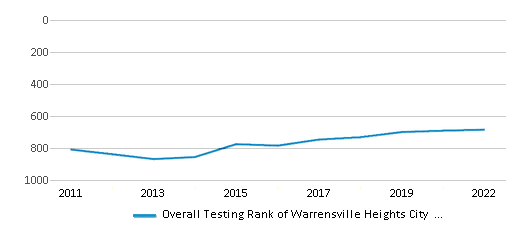
Math Test Scores (% Proficient)
27%
52%
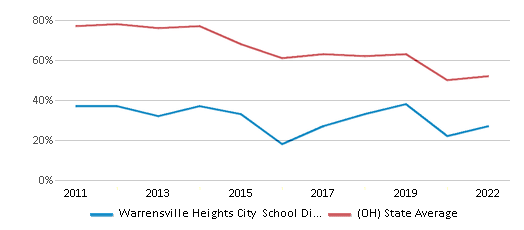
Reading/Language Arts Test Scores (% Proficient)
36%
60%
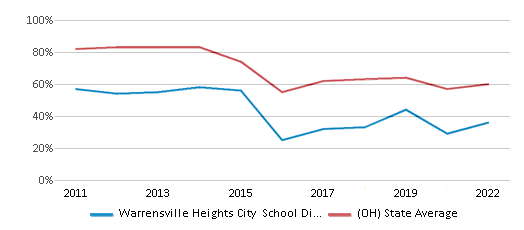
Science Test Scores (% Proficient)
30%
63%
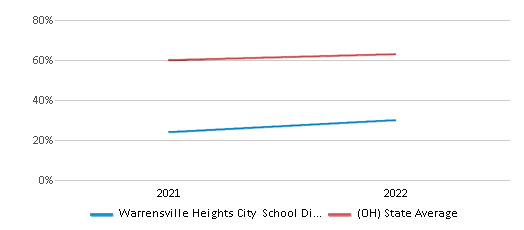
Graduation Rate
≥95%
86%
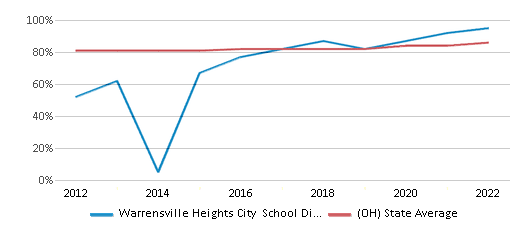
Students by Ethnicity:
Diversity Score
0.12
0.58
# American Indian Students
2 Students
462 Students
% American Indian Students
n/a
n/a
# Asian Students
8 Students
8,061 Students
% Asian Students
n/a
3%
# Hispanic Students
50 Students
30,384 Students
% Hispanic Students
3%
9%
# Black Students
1,796 Students
67,190 Students
% Black Students
94%
20%
# White Students
9 Students
204,949 Students
% White Students
n/a
61%
# Hawaiian Students
2 Students
329 Students
% Hawaiian Students
n/a
n/a
# Two or more races Students
50 Students
22,737 Students
% of Two or more races Students
3%
7%
Students by Grade:
# Students in PK Grade:
72
45,802
# Students in K Grade:
120
55,948
# Students in 1st Grade:
130
51,388
# Students in 2nd Grade:
177
49,073
# Students in 3rd Grade:
117
40,515
# Students in 4th Grade:
139
38,905
# Students in 5th Grade:
132
30,860
# Students in 6th Grade:
150
12,193
# Students in 7th Grade:
136
4,329
# Students in 8th Grade:
122
4,221
# Students in 9th Grade:
172
368
# Students in 10th Grade:
148
211
# Students in 11th Grade:
164
188
# Students in 12th Grade:
138
111
# Ungraded Students:
-
-
District Revenue and Spending
The revenue/student of $24,150 is higher than the state median of $17,287. The school district revenue/student has declined by 14% over four school years.
The school district's spending/student of $29,053 is higher than the state median of $17,235. The school district spending/student has declined by 14% over four school years.
Total Revenue
$46 MM
$28,879 MM
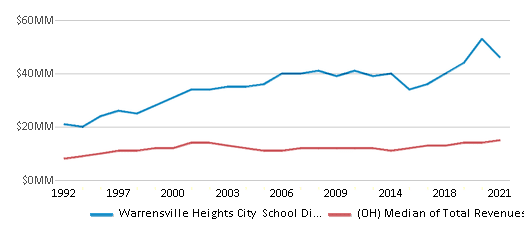
Spending
$56 MM
$28,792 MM
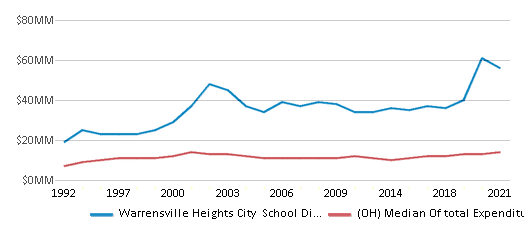
Revenue / Student
$24,150
$17,287
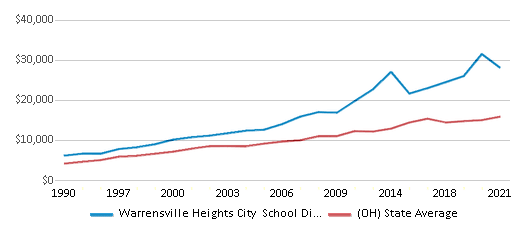
Spending / Student
$29,053
$17,235
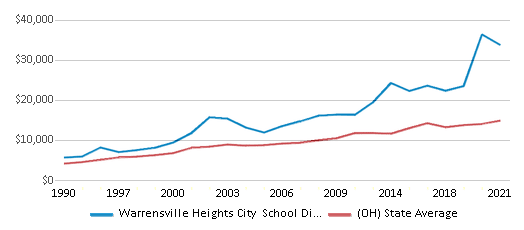
Best Warrensville Heights City School District Public Preschools (2025)
School
(Math and Reading Proficiency)
(Math and Reading Proficiency)
Location
Grades
Students
Rank: n/an/a
4265 Northfield Road
Cleveland, OH 44128
(216) 364-1014
Cleveland, OH 44128
(216) 364-1014
Grades: PK-K
| 185 students
Recent Articles

What Is A Charter School?
Explore the world of charter schools in this comprehensive guide. Learn about their history, how they operate, and the pros and cons of this educational innovation. Discover key facts about charter schools, including admission policies, demographics, and funding, as well as what to look for when considering a charter school for your child.

10 Reasons Why High School Sports Benefit Students
Discover the 10 compelling reasons why high school sports are beneficial for students. This comprehensive article explores how athletics enhance academic performance, foster personal growth, and develop crucial life skills. From improved fitness and time management to leadership development and community representation, learn why participating in high school sports can be a game-changer for students' overall success and well-being.

February 05, 2025
Understanding the U.S. Department of Education: Structure, Impact, and EvolutionWe explore how the Department of Education shapes American education, from its cabinet-level leadership to its impact on millions of students, written for general audiences seeking clarity on this vital institution.





